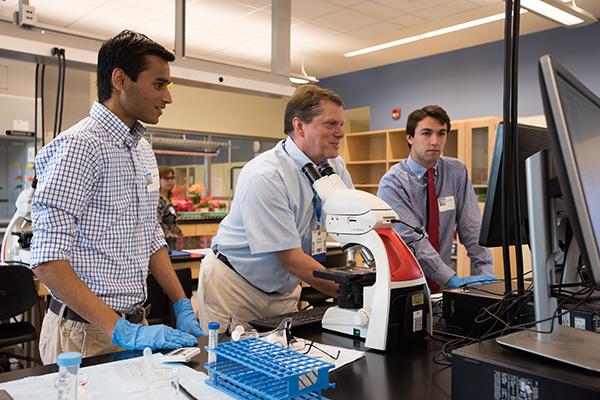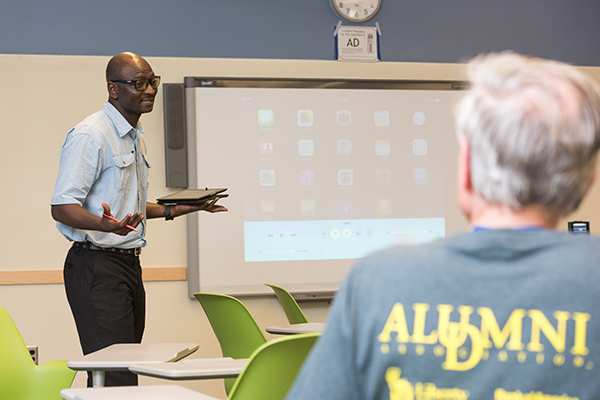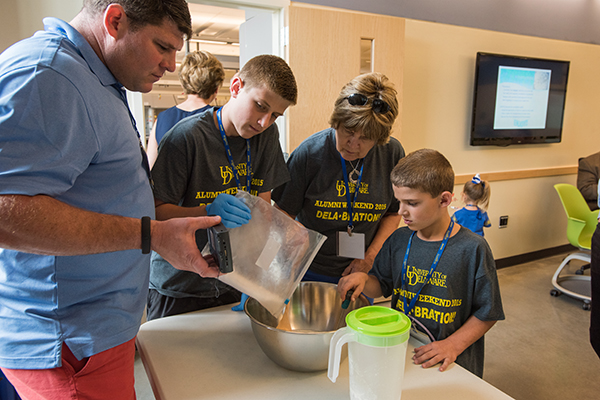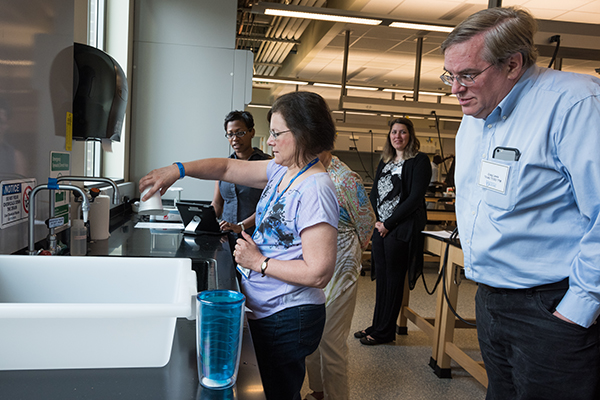


Power of PBL
Alumni become students to experience problem-based learning
12:59 p.m., June 11, 2015--Kathy Schreiber wanted to learn more about the instructional methods used in problem-based learning (PBL) to incorporate some of those ideas into her teaching at Millersville University in Pennsylvania, where she is a professor of geography.
Craig Lewis had toured the University of Delaware’s Patrick T. Harker Interdisciplinary Science and Engineering Laboratory when it was still under construction two years ago, and he wanted to “come back and see it in action,” he said.
Campus Stories
From graduates, faculty
Doctoral hooding
Both got their chance on Saturday, June 6, when they attended a special Alumni Weekend demonstration called “The Power of PBL.” Schreiber earned bachelor’s degrees in sociology and geography in 1983 and a doctorate in climatology in 1996, all at UD, and Lewis earned bachelor’s degrees in math in 1974 and computer science in 1975, as well as a master’s degree in computer science in 1977, also all at UD.
They joined fellow alumni in becoming students again — if only for two hours — in a demonstration class held in Harker Laboratory and led by George Watson, dean of the College of Arts and Sciences and an expert in PBL.
“The learning cycle starts with a problem, a real-world complex problem,” Watson, who earned his doctorate in physics at UD in 1985, told the group gathered in one of the building’s small classrooms with adjoining instructional labs. By challenging students to analyze that problem and to connect information from multiple subjects to address it, the PBL approach engages student and leads them to make “incredible leaps” in learning, Watson said.
The demonstration class showcased many of the hallmarks of PBL. A team of faculty members and preceptors worked to present the problems and help students find solutions. And the students themselves worked in small groups, with the members selected randomly, because “interesting things happen when you work in groups, and in real life, you don’t always get to choose who you work with,” said Adebanjo Oriade, a Harker Laboratory preceptor in physics.
The alumni students divided into groups, moved from the classroom into the labs and began working on their assigned problems.
In the physics group, for example, one team gathered data on how fast coffee filters fell when dropped, some while open and others after being crumpled. Another group filled different types of glasses with water, covered them with different types and sizes of cards, and investigated which ones could be turned upside down or sideways without losing their covers and spilling their contents.
Guided by Oriade and preceptor Christina Wesolek, the students used iPads and other technological tools to record, graph, create photos and videos and analyze their results. They gathered again and explained their findings to one another.
When doing a similar exercise with undergraduates, Wesolek said, she might point out the comparison of the coffee filter experiment to the real experience of skydiving. When an object has more surface area — a wide-open coffee filter or a skydiver with her arms spread wide — it falls more slowly than when it is compact.
Other alumni groups took part in similar problem-solving involving biology, and the entire group concluded the session with an exercise combining biology and chemistry that resulted in a batch of homemade ice cream shared among the students.
For one group of participants, the session was a three-generation family affair. Goodwin Cobb IV, a member of the Class of 1999, and his wife, Maria Cobb, a member of the Class of 1999 who received a master’s degree in 2002, attended with their three children and Goodwin Cobb’s mother, Paula Cobb.
“We thought it would be a good educational experience for our children [ages 13, 9 and 3], and we wanted to expose them to what the University has to offer,” Maria Cobb said. “We hope that all three of them will be alumni someday.”
Article by Ann Manser
Photos by Kathy F. Atkinson











